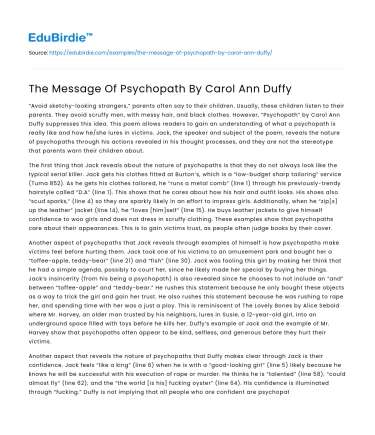“Avoid sketchy-looking strangers,” parents often say to their children. Usually, these children listen to their parents. They avoid scruffy men, with messy hair, and black clothes. However, “Psychopath” by Carol Ann Duffy suppresses this idea. This poem allows readers to gain an understanding of what a psychopath is really like and how he/she lures in victims. Jack, the speaker and subject of the poem, reveals the nature of psychopaths through his actions revealed in his thought processes, and they are not the stereotype that parents warn their children about.
The first thing that Jack reveals about the nature of psychopaths is that they do not always look like the typical serial killer. Jack gets his clothes fitted at Burton’s, which is a “low-budget sharp tailoring” service (Tuma 852). As he gets his clothes tailored, he “runs a metal comb” (line 1) through his previously-trendy hairstyle called “D.A” (line 1). This shows that he cares about how his hair and outfit looks. His shoes also “scud sparks,” (line 4) so they are sparkly likely in an effort to impress girls. Additionally, when he “zip[s] up the leather” jacket (line 14), he “loves [him]self” (line 15). He buys leather jackets to give himself confidence to woo girls and does not dress in scruffy clothing. These examples show that psychopaths care about their appearances. This is to gain victims trust, as people often judge books by their cover.
Save your time!
We can take care of your essay
- Proper editing and formatting
- Free revision, title page, and bibliography
- Flexible prices and money-back guarantee
Another aspect of psychopaths that Jack reveals through examples of himself is how psychopaths make victims feel before hurting them. Jack took one of his victims to an amusement park and bought her a “toffee-apple, teddy-bear” (line 21) and “fish” (line 30). Jack was fooling this girl by making her think that he had a simple agenda, possibly to court her, since he likely made her special by buying her things. Jack’s insincerity (from his being a psychopath) is also revealed since he chooses to not include an “and” between “toffee-apple” and “teddy-bear.” He rushes this statement because he only bought these objects as a way to trick the girl and gain her trust. He also rushes this statement because he was rushing to rape her, and spending time with her was a just a ploy. This is reminiscent of The Lovely Bones by Alice Sebold where Mr. Harvey, an older man trusted by his neighbors, lures in Susie, a 12-year-old girl, into an underground space filled with toys before he kills her. Duffy’s example of Jack and the example of Mr. Harvey show that psychopaths often appear to be kind, selfless, and generous before they hurt their victims.
Another aspect that reveals the nature of psychopaths that Duffy makes clear through Jack is their confidence. Jack feels “like a king” (line 6) when he is with a “good-looking girl” (line 5) likely because he knows he will be successful with his execution of rape or murder. He thinks he is “talented” (line 58); “could almost fly” (line 62); and the “the world [is his] fucking oyster” (line 64). His confidence is illuminated through “fucking.” Duffy is not implying that all people who are confident are psychopaths, but those people who are unconfident likely do not murder because they are likely thinking things like: what if I get caught?
The poem has eight eight-lined stanzas, which shows that the poem appears to have a structure or order on the outside. However, once the poem is read, there is a lack of chronology to these rapes and murders. All that readers gain is a messy thought-process of things that have happened without a sequence. This structure mirrors two concepts: the first one is that murder is messy, just like Jack’s statements. The second one is that the structure of the poem mirrors the nature of the psychopath: the poem is clean on the outside with the 8 by 8 structure, but appearances deceive.
Through “Psychopath,” Duffy diminishes the notion that serial killers and rapists look like the typical stereotype that people create of them. This poem, as scary and uncomfortable as it is, should be read by the parents that believe their children should only avoid the men dressed in black with dirty hands and shabby beards. Arguably, the sad message that Duffy is trying to convey is that we cannot trust anyone.






 Stuck on your essay?
Stuck on your essay?

